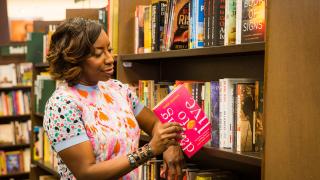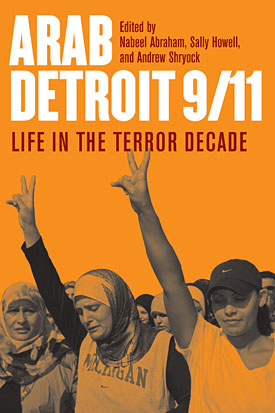
Freshly Pressed highlights books written or edited by members of the University of Michigan-Dearborn community. Faculty, staff, alumni and students are welcome to submit their recently published titles to this column by e-mailing Reporter editor Jennifer Thelen at [email protected] with a summary of the book, a high-resolution JPEG of the book’s cover and a URL where readers can purchase the title, if applicable.
Sally Howell, assistant professor of history, has edited Arab Detroit 9/11: Life in the Terror Decade (with co-editors Nabeel Abraham and Andrew Shryock), which is being published by Wayne State University Press this month.
In addition, Howell's article "(Re)Bounding Islamic Charitable Giving in the Terror Decade," also appears in the latest issue of the UCLA Journal of Islamic and Near Eastern Law.
 From the Wayne State University Press website: Since the terrorist attacks of Sept. 11, 2001, Detroit’s large and nationally-prominent Arab and Muslim communities have faced heightened prejudice, government surveillance and political scapegoating, yet they also have enjoyed unexpected gains in economic, political, and cultural influence. Museums, festivals and cultural events flourish alongside the construction of new mosques and churches, and more Arabs are being elected and appointed to public office. Detroit’s Arab population is growing even as the city’s non-Arab sectors, and the state of Michigan as a whole, have steadily lost population.
From the Wayne State University Press website: Since the terrorist attacks of Sept. 11, 2001, Detroit’s large and nationally-prominent Arab and Muslim communities have faced heightened prejudice, government surveillance and political scapegoating, yet they also have enjoyed unexpected gains in economic, political, and cultural influence. Museums, festivals and cultural events flourish alongside the construction of new mosques and churches, and more Arabs are being elected and appointed to public office. Detroit’s Arab population is growing even as the city’s non-Arab sectors, and the state of Michigan as a whole, have steadily lost population.
In Arab Detroit 9/11: Life in the Terror Decade, a follow-up to their volume Arab Detroit: From Margin to Mainstream (Wayne State University Press, 2000), editors Howell, Abraham and Shryock present accounts of how life in post-9/11 Detroit has changed over the last 10 years.
Howell, Abraham and Shryock have assembled a diverse group of contributors whose essays range from the scholarly to the artistic and include voices that are Palestinian, Iraqi, Yemeni, and Lebanese; Muslim and Christian; American born and immigrant.
The book is divided into six sections and begins with wide-angle views of Arab Detroit, looking first at how the community fits within greater Detroit as a whole, then presenting closer portraits of Arab Detroit’s key ethnonational and religious subgroups. More personal, everyday accounts of life in the Terror Decade follow as focus shifts to practical matters such as family life, neighborhood interactions, going to school, traveling domestically, and visiting home countries. Finally, the contributors consider the interface between Arab Detroit and the larger society, how this relationship is maintained, how the War on Terror has distorted it, and what lessons might be drawn about citizenship, inclusion and exclusion by situating Arab Detroit in broader and deeper historical contexts.
In Detroit, new realities of political marginalization and empowerment are evolving side by side. As they explore the complex demands of life in the Terror Decade, the contributors to this volume create vivid portraits of a community that has fought back successfully against attempts to deny its national identity and diminish its civil rights. Readers interested in Arab studies, Detroit culture and history, transnational politics, and the changing dynamics of race and ethnicity in America will enjoy the personal reflection and analytical insight of Arab Detroit 9/11.
A book signing for Arab Detroit 9/11: Life in the Terror Decade will take place on Sept. 21 on the campus of Henry Ford Community College. UM-Dearborn will host a panel discussion with several of the book's contributors on Oct. 20. Look for more information in an upcoming issue of the Reporter.
For more information on the book, visit the Wayne State University Press website.
Book cover courtesy Wayne State University Press.





